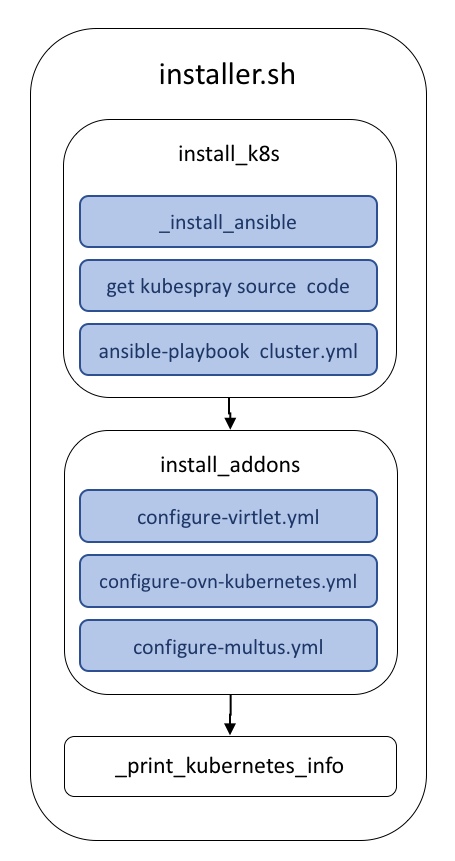- Motivation
Architecture blocks
- Setup information
- Online setup
- Offline setup ( WIP )
- Proposed Workflow diagram
Offline setup flow - tested
- Challenges
Motivation
This project offers a means for deploying a Kubernetes cluster that satisfies the requirements of ONAP multicloud/k8s plugin.
Its ansible playbooks allow provisioning a deployment on Virtual Machines and on Baremetal.
KuD facilitates virtual deployment using Vagrant and Baremetal deployment using the All-in-one script.
| Name | Description | Source | Status |
|---|---|---|---|
| Kubernetes | Base Kubernetes deployment | kubespray | Done |
| ovn4nfv | Integrates Opensource Virtual Networking | configure-ovn4nfv.yml | Tested |
| Virtlet | Allows to run VMs | configure-virtlet.yml | Tested |
| Multus | Provides Multiple Network support in a pod | configure-multus.yml | Tested |
| NFD | Node feature discovery | configure-nfd.yml | Tested |
| Istio | Service Mesh platform | configure-istio.yml | Tested |
Architecture blocks
Setup information
Online setup
To deploy KuD independent of ICN please refer to the documents/instructions here.
Offline setup.
Offline setup flow - tested
- Get all the dependency packages and resolve the dependency in the right order
- Install basic components for KuD
- Run the installer script
- Docker
- Ansible
- Get the kubespray prescribed version listed in KuD
- Get the correct version of Kubeadm, etcd, hypercube, cni
- Get the docker images used by kubespray
- load them making sure the right versions are available.
- We had the override the following defaults in Kubespray:
- Download_run_once: true
- Dowload_localhost: true
- Skip_downloads: true
- Strict_dns_check: False
- Update_cache: False
- Helm_client_refersh: False
- Get galaxy-requirements
- Get galaxy requirements dependents
- Run the roles
- Get add-ons
- Modify the ansible script to not pull from the web and instead use from release dir and run the playbook. (Tested for Multus)
- Run all the addon playbooks
- KuD offline done. Run the test cases to verify
Challenges
The values listed above are the changes that could be overridden in K8s-cluster.yml. However, some of the changes did not have his option. There are cases where we had to manually change some defaults in Kubespray code.
One of the places is when it checks for docker_version in ubuntu_bionic.yml. The existing version is 18.06.0 expected is 18.06.1. Tried to change this by supplying the correct/requested version by Kubespray. Regardless it fails unless we change the hardcoded version in the https://github.com/kubernetes-sigs/kubespray/blob/release-2.8/roles/container-engine/docker/vars/ubuntu-bionic.yml#L6
Another case where we encountered issues is when ansible runs a name: ensure docker packages are installed
update_cache: "{{ omit if ansible_distribution == 'Fedora' else False }}"
Right now we have the K8s cluster setup in offline mode on the client-server machine replicated in the lab. However, we see that support for the offline version is poor for v2.8.2 currently used by KUD. Setting up the galaxy requirement has been a blocker. We have developed an approach to it to get the add-ons going.
